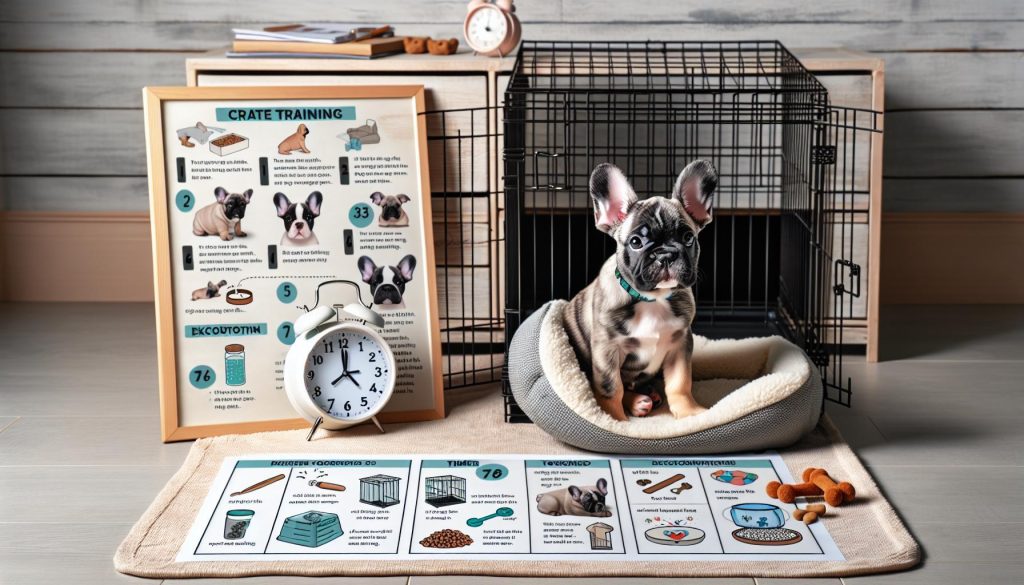About
The Best Crate Training Tips for French Bulldogs
Page Contents
Crate training can be a game-changer for French Bulldog owners,offering a safe haven for your furry friend while promoting good behavior. Known for their affectionate nature and occasional stubborn streak, French Bulldogs can benefit immensely from effective crate training techniques. In this article, we’ll explore the best tips and tricks to ensure a smooth and prosperous crate training experience. Whether you’re a first-time Frenchie parent or a seasoned owner, these insights will help you create a comfortable and positive surroundings for your beloved pet.
Understanding French Bulldog Behavior
French Bulldogs, with their charming personalities and distinctive bat-like ears, are known for being affectionate, playful, and sometimes a bit stubborn.Understanding their behavior is key to successful crate training. These dogs thrive on human interaction and can develop separation anxiety if left alone for too long. Therefore, it’s important to make the crate a positive and comforting space rather than a place of isolation.
French Bulldogs are clever and curious, but they can also be quite independent. This means that while they are rapid learners, they may also test boundaries. **Consistency** is crucial when training them. Establish a routine that includes regular crate time, and always use positive reinforcement, such as treats or praise, to encourage desired behaviors.
- **Social Creatures:** They enjoy being around people and can become distressed if isolated. Ensure crate time is balanced with plenty of social interaction.
- **Stubbornness:** They may resist at first, so patience is essential. Gradually increase crate time to help them adjust.
- **Sensitivity:** French Bulldogs are sensitive to their environment. Keep their crate in a calm,quiet area to reduce stress.
Choosing the Right Crate Size
When selecting a crate for your French Bulldog, size is paramount to ensure comfort and effectiveness in training. A crate that is too small can cause discomfort, while one that is too large may encourage your pup to use one corner as a bathroom. **The ideal crate should be just large enough for your Frenchie to stand, turn around, and lie down comfortably.** This size not onyl promotes a sense of security but also reinforces the crate as a place for rest, not play or elimination.
Consider the following tips when choosing the perfect crate size for your French Bulldog:
- **Measure your Frenchie**: Take accurate measurements of your dog’s height and length. Add a few inches to these measurements to determine the appropriate crate dimensions.
- **Anticipate growth**: If you have a Frenchie puppy, consider a crate with a divider panel. This feature allows you to adjust the living space as your puppy grows, maintaining the crate’s effectiveness throughout different growth stages.
- **Check for comfort features**: Look for crates with smooth edges and a comfortable base. You might want to add a soft mat or a bed to ensure your Frenchie feels cozy and secure.
Remember, the right crate size is crucial not only for training success but also for your French Bulldog’s overall well-being. By providing a properly sized crate, you create a safe haven that your Frenchie will love retreating to.
Creating a Comfortable Crate Space
To ensure your French Bulldog feels at ease in their crate, focus on transforming it into a cozy den-like environment. Begin by selecting a crate that’s appropriately sized—allowing your dog to stand, turn around, and lie down comfortably without too much extra space. This helps them feel secure and reduces the temptation to use one corner as a bathroom. **Soft bedding** is essential; consider using a plush, washable crate mat or blanket that provides warmth and comfort.
personalizing the space can also make a big difference. Incorporate a few of your Frenchie’s favorite toys to keep them entertained and reduce anxiety. **chew toys** are particularly beneficial, as they can definitely help soothe teething puppies and keep adult dogs occupied.Placing a piece of your clothing in the crate can also offer a comforting scent, making the space feel familiar and safe.
think about the crate’s location within your home. Position it in a quiet, low-traffic area where your dog can relax without feeling isolated. Avoid areas with direct sunlight or drafts, and consider covering the crate with a breathable cloth to mimic a den-like atmosphere, provided that it doesn’t restrict airflow. By thoughtfully designing a comfortable crate space, you’re setting the stage for successful crate training and a happy, well-adjusted French Bulldog.
Establishing a Consistent Routine
Creating a reliable daily schedule is crucial for the successful crate training of your French Bulldog. Consistency helps build a sense of security and predictability, which is essential for these intelligent yet sometimes stubborn companions. Begin by introducing your Frenchie to their crate with a positive attitude, making sure to associate it with comfort and safety. Gradually establish a routine that aligns with their natural rhythms, including regular feeding times, bathroom breaks, and play sessions.
**Morning routine:** Start the day by taking your Frenchie out of the crate for a bathroom break, followed by a meal. After eating, allow some time for play or a short walk. This not only helps expend energy but also reinforces the idea that the crate is a place for rest, not play.
- **Consistent Feeding Times:** Feed your French Bulldog at the same times each day to regulate their bathroom schedule.
- **Scheduled Breaks:** Plan regular intervals for bathroom breaks, especially after meals and naps, to prevent accidents.
- **Play and Exercise:** Incorporate playtime and exercise into their routine to ensure they have ample opportunity to burn off energy.
**Evening Routine:** As the day winds down, establish a calming routine to signal bedtime. A brief walk or some quiet bonding time can definitely help your Frenchie relax before being crated for the night. Consistently following these routines will not only make crate training more effective but also enhance your dog’s overall well-being.
Positive Reinforcement Techniques
- **Treats and Praise:** French Bulldogs respond exceptionally well to treats and verbal praise. When your Frenchie enters the crate willingly or stays calm inside, promptly reward them with a small, tasty treat and a cheerful “Good job!” This positive association helps them view the crate as a safe and rewarding space.
- **Consistency is Key:** Make sure to maintain consistency in your reinforcement techniques. Every time your French bulldog exhibits desired behavior related to crate training, such as entering the crate without hesitation or staying quiet, ensure they receive a consistent reward. over time,this consistency will reinforce the behavior,making it second nature for your pup.
- **Interactive Toys:** Introduce interactive toys or puzzle feeders inside the crate to keep your French Bulldog engaged and entertained. These toys not only provide mental stimulation but also create a positive and enjoyable atmosphere within the crate. As your Frenchie associates the crate with fun activities, their willingness to spend time inside will naturally increase.
Handling Setbacks with Patience
training a French Bulldog is a journey that comes with its own set of challenges. It’s not uncommon to encounter setbacks along the way, but handling these with patience is crucial for both you and your pup. Remember, consistency is key. When accidents happen or progress seems to stall, take a step back and assess the situation calmly. Ask yourself if there have been any changes in routine or environment that might be affecting your dog’s behavior. Understanding the root of the issue can help you address it more effectively.
Here are some strategies to help you navigate these bumps in the road:
- Stay Calm: dogs can sense frustration and stress. Maintaining a calm demeanor helps your Frenchie feel secure and more likely to follow your guidance.
- Revisit Basics: Sometimes,going back to the basics of crate training can reinforce positive behaviors. Reintroduce short, positive crate experiences with lots of praise and treats.
- Consistency is key: Ensure that everyone in the household is on the same page with the training methods and schedules. Mixed signals can confuse your dog and hinder progress.
Patience is not just a virtue but a necessity when training your French Bulldog.Celebrate small victories and remember that each dog learns at their own pace. By approaching setbacks with understanding and a positive attitude, you’ll not only improve the training process but also strengthen the bond with your furry friend.
Transitioning to Longer Crate Times
Once your french Bulldog is comfortable with shorter crate sessions, gradually increase the duration to help them adapt to longer periods. Start by adding small increments of time, such as 10 to 15 minutes, to their current crate schedule. It’s essential to monitor your pup’s behavior during this transition. Look for signs of anxiety or discomfort, and adjust the time accordingly. remember, patience is key, and every dog progresses at their own pace.
To make longer crate times more enjoyable, ensure the crate is a positive and inviting space. Consider adding a comfortable bed or blanket, and include safe chew toys or interactive puzzles to keep your furry friend entertained. A consistent routine can also be beneficial; try crating your dog after a walk or play session when they’re more likely to be tired and ready for a rest.
- **Provide plenty of exercise**: A well-exercised dog will be more likely to relax in the crate.
- **Use positive reinforcement**: Reward your Frenchie with treats and praise when they enter the crate willingly.
- **Gradual desensitization**: Practise leaving the room for short periods while your dog is crated to build their confidence.
By following these strategies, you’ll help your French Bulldog feel more comfortable with extended crate times, ensuring they remain happy and stress-free while you’re away.
ensuring Safety and Comfort
When crate training a French Bulldog, prioritizing their safety and comfort is crucial for a successful experience. Start by selecting a crate that is appropriately sized. **The crate should be large enough** for your Frenchie to stand, turn around, and lie down comfortably, but not so large that they can designate a separate area for elimination.A snug fit will make them feel secure and more inclined to see the crate as a den-like space.
To enhance comfort, **line the crate with soft bedding**. Opt for materials that are easy to clean and durable, as French Bulldogs can be notorious chewers. Consider using a crate pad or a plush blanket that can easily be washed. Providing a favorite toy or chew item can also make the crate more inviting and keep your Frenchie entertained.
Safety is another key consideration. **Avoid placing the crate in areas with extreme temperatures**, such as near a radiator or in direct sunlight, to prevent overheating. Ensure that the crate is placed in a quiet, low-traffic area of your home, but still within earshot of family activities, so your Frenchie feels included. Regularly inspect the crate for any sharp edges or loose parts that could pose a hazard. By creating a safe and comfortable environment,you can make crate training a positive experience for your French Bulldog.
In Summary
Incorporating these crate training tips can make a world of difference for both you and your French Bulldog. With patience, consistency, and a positive approach, your furry friend will soon see their crate as a safe haven. Remember, every dog is unique, so tailor these strategies to suit your pet’s personality and needs. By investing time and effort now, you’re setting the foundation for a well-behaved and happy companion.Enjoy the journey with your Frenchie, and cherish the bond that grows stronger with each successful step in their training.

